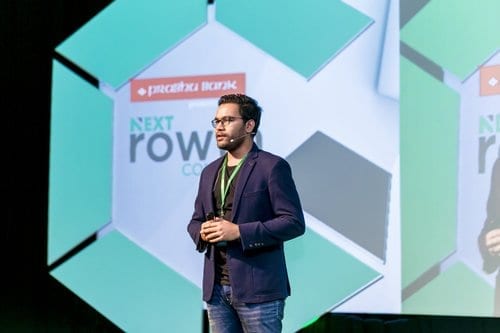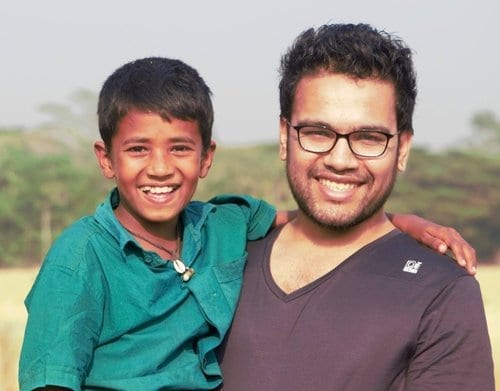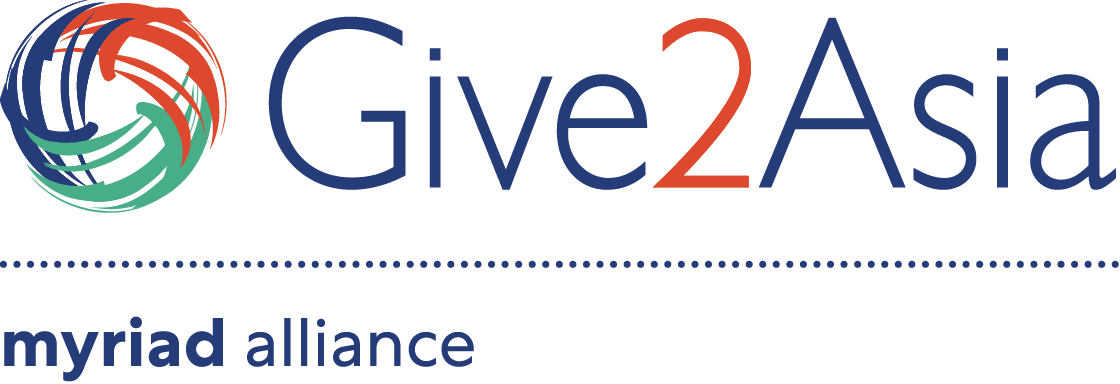Being that Give2Asia works with a slew of highly qualified field advisors in 25 locations, we will be creating profile pieces to provide on-the-ground insights into each local scene and engage with this critical part of our workforce. We continue our spotlight series with Shazeeb Islam, our field advisor in Bangladesh.
Where do you live?
I live in Dhaka, the capital city of Bangladesh. It is also the largest city in the country and I consider it the Silicon Valley of Social Innovation.
What languages do you speak?
I speak both Bangla and English.
What is your favorite food and how is it cooked?
I like chicken biriyani. It is a classic dish that is often served at weddings and celebrations. However, it is a common dish to occasionally be made at home for dinner as well. The ingredients include all types of spices, basmati rice, chicken, onions, chilli, etc. Firstly, you are to marinate the chicken with all the spices, either paste or powder, then cook the basmati rice. After this, put the chicken in a pot and spread the cooked rice all over the chicken and let it cook for a while with the lid on. You need to check after a while whether it is cooked. If it is cooked, then you need to seal the pot with the lid on with flour dough and let it rest for a while. Finally, it is ready to be served after removing the flour dough with which it was sealed. My mother cooks the best chicken biryani on earth.
Where have you travelled to in Asia, or would like to travel?
I have already travelled to Nepal, India, Thailand, Malaysia, and China, and I am looking forward to traveling to the Phillipines, Cambodia and Laos very soon.
How did you get involved with the international development sector?
I have been a social entrepreneur since my University days and while building my social business I came across a lot of social entrepreneurs who struggle due to a lack of funding, mentorship and access to resources. Thus, I took responsibility for YGAP Bangladesh in December 2016 as the founding Country Director. YGAP is an international development non-profit organization with an innovative way of alleviating poverty which backs local leaders with local solutions in Asia, Africa and the Pacific. Since early 2017, I have been the CEO of YY Goshti, a social business incubator that offers entrepreneurship programs for early stage social entrepreneurs.
What are your responsibilities as a field advisor for Give2Asia? What are some of the things you see in this role?
As a Give2Asia Field Advisor I facilitate the due diligence process for new and prospective grantees as well as for existing grantees needing renewals, review due diligence documents that are submitted, and advise Give2Asia as to whether the organization should be considered for Give2Asia grants. I also facilitate grants administration for all grants in Bangladesh and invest some time in grant monitoring and reporting, which includes: conducting mid-point telephone check-ins with grantees; grantee site visits when necessary; advising Give2Asia on the performance of the grantee; ensuring timely receipt of reports from grantees; reviewing all grantee reports to ensure they are complete and in compliance with Give2Asia standards, etc. I love my work at Give2Asia because I get to work with the entrepreneurs on ground while they challenge some of the most pressing social issues or come up with innovative approaches to solve the existing problems.

How do you fill the rest of your time? What do you do for fun?
Most of my time is spent as the CEO of YY Goshti, where I run entrepreneurship programs to help young people launch social businesses. It is a platform to support social businesses in their earliest idea stages with the right kinds of resources, networks and environment. So far we have supported 30+ entrepreneurs who are building social businesses/enterprises in the field of agriculture, water and sustainable communities. As part of my role at YY Goshti, I am setting up community-based water treatment plants in rural Bangladesh where there is lack of access to clean drinking water. In between my busy work schedule, I like to switch off at times and travel in Bangladesh and abroad. Playing cricket with cousins gives me great joy and I also like to attend cultural events and concerts.
Please tell us about your favorite Give2Asia project and why.
I think among all the Give2Asia projects in Bangladesh, I most like the disaster preparedness programs. Now we are working with two NGOs while they run projects on improving the lives of the people living in disaster-prone areas in southern Bangladesh.Through the NGO Disaster Preparedness Project we are working with BEDS and AOSED in areas close to the Sundarbans, which is highly prone to disasters, to fund innovative programming at the community level and to develop resources for donors and international organizations to better understand the disaster landscape in Bangladesh. One of the projects is assisting fishermen and their families to forecast the weather and helping them with resources and equipment that will save their lives when hit by storms and floods at sea.
What are the greatest challenges nonprofits in Bangladesh face?
The greatest challenges faced by nonprofit organizations in a developing country like Bangladesh are hiring and retaining workers on a non-profit budget, making people understand the trends of social entrepreneurship and how they benefit nonprofits, measuring impact and ensuring sustainability. As Bangladesh is getting economically stronger, development funding has reduced significantly in the last few years and this is where a lot of non-profits are struggling to raise money for their programs and projects.
How do you see the social sector in Bangladesh changing in the next 10 years?
The image of Bangladesh has undergone a major transformation in the past years from a famine- or flood-affected country to a country rich with social innovations. The social sector of Bangladesh is moving from traditional philanthrophy to creating sustainable social businesses and enterprises with pioneering leadership from organizations like Grameen or BRAC. The social sector these days is having a wider span of focus and is currently delivering services or products to the last mile. A lot of traditional non-profits are now-a-days facing challenges in terms of sustainability, but we have also seen great successes in the fields of financial inclusion, access to energy and water. In 10 years, I assume most of the traditional non-profits will have a diversified portfolio with enterprises and sustainable programs which will help the country better achieve the SDGs.
What is a unique aspect of the social sector in Bangladesh that you want Give2Asia’s community of donors and grantees to know about?
I find Bangladesh’s social sector unique in terms generating innovative solutions to fight poverty, energy crises or ensuring access to food for all. Bangladesh’s economic growth remains resilient in spite of export growth, reduction in remittances and regulatory challenges, but our entrepreneurs have always found ways to produce innovations (e.g., Grameen Bank, bKash, etc.). We are also adopting global management best practices and building a highly skilled workforce. We have had great GDP growth in recent years and expect to continue this in the coming years, and I would hope that the international community would mobilize help to more funds and technology for Bangladesh while we solve its most crucial social issues.
Lightning Round…
Favorite song?
I don’t have a specific favorite song but I like songs by Rabindranath Tagore, and some of my favorite bands are Westlife, Backstreet Boys, Michael Learns To Rock, and Coldplay.
 What are you reading right now?
What are you reading right now?
I am currently reading the book ‘Small Giants: Companies that Choose to be Great Instead of Big’ by Bo Burlingham. I have just finished reading ‘A World of Three Zeros’ by Muhammad Yunus, which is a great read for entrepreneurs who are excited about the concept of social business.
Favorite snack?
I am always up for potato wedges as a snack.
Favorite pastime?
I listen to music whenever I have time.
What advice would you give your past self?
I think while starting up as an entrepreneur, I was not that focused. I have learned that to grow as an entrepreneur, and as a person, you really need to focus on a specific work and to spend a lot of quality time with your family.




